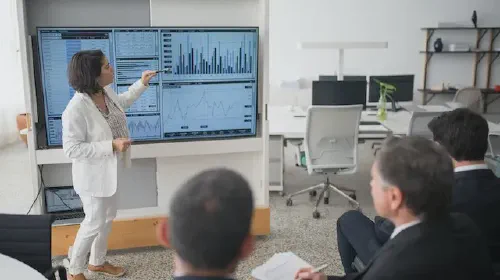The Ethical Debate: Humans vs. AI
Salomon Kisters
Jun 29, 2023This post may contain affiliate links. If you use these links to buy something we may earn a commission. Thanks!
Artificial Intelligence (AI) has gotten a lot better in recent years and has changed the way we live and work.
AI is used in things like virtual assistants (like ChatGPT) and self-driving cars.
Suddenly, people are arguing about whether AI should be treated like humans.
Some people say that AI is just something humans made and it doesn’t have emotions or morals. They think we should control AI and make sure it doesn’t cause harm.
Other people believe that AI can do more than just copy human behavior. They think AI can be aware of itself and learn and even have feelings. They think we should treat AI nicely and protect them.
AI is getting better and there are more and more questions about how it should be used. People worry about losing jobs, invasion of privacy, and losing our human values.
They also worry about what it means to create something intelligent!
Come join us as we talk about the debate between humans and AI. We’ll look at different points of view and talk about the consequences of our choices.
The Rise of AI
AI is getting smarter and can do things that only humans could do before. This raises questions about whether AI will become more powerful than humans. Some people think that AI might take over and humans won’t be in charge anymore.
One concern is that AI could take people’s jobs. As AI gets better, there’s a fear that it will replace humans at work. AI can do tasks faster and without getting tired, so it’s already starting to replace people in different industries, like manufacturing and customer service. This not only affects people’s jobs but also has a big impact on society and the economy.
Another worry is about privacy and freedom. AI can collect and analyze a lot of data, which could end up invading people’s privacy. It can learn personal information, preferences, and behavior, and that information could be used by companies and governments. This raises questions about the ethics of using AI to collect and use personal data.
There’s also the concern that AI could reinforce biases and discrimination. Even though AI doesn’t have emotions, it can learn from humans and end up copying unfair behaviors and beliefs. This could make inequalities in society even worse as AI becomes more integrated into our lives.
Creating advanced AI makes us think about what intelligence and being human really mean. If AI becomes self-aware and seems conscious, it challenges what we thought made humans special. Are humans the only ones who can be conscious and have emotions, or could AI eventually have these qualities too?
We need to think about the consequences of our choices in the ethical debate between humans and AI. AI offers many advantages, but it also brings challenges.
Finding the right balance between using AI’s potential and protecting human values is really important. The decisions we make now will shape the future of technology, society, and the relationship between humans and AI.
Human Error vs. AI Bias
Human mistakes and AI bias are both important when making decisions. Humans can make mistakes because they are not perfect. They can make wrong calculations or have limited information. AI bias happens when machines make decisions that aren’t fair because of the data they are given.
Human errors are often seen as the individual’s fault, while AI bias is seen as a problem with the machine. Humans can learn from their mistakes, but AI bias can continue to make unfair decisions.
It is hard to know how much human error or AI bias can affect things. Human mistakes can be fixed with feedback and improvement. But AI bias can affect a lot of people because AI is used in many areas. This can have a big impact on marginalized groups.
To solve this problem, we need to find a balance. We need to accept that humans make mistakes and hold them accountable. We also need to ensure that AI systems are fair and don’t have bias. This means being open about how AI works and having a diverse team that develops AI. It also means training humans to make good decisions and follow ethical guidelines.
In the end, which is worse, human error or AI bias? It depends on the situation. We need to always be working on making better decisions and fairer AI. We want progress, but we also want fairness and responsibility.
The Impact on Employment
AI is a new kind of intelligence that some people are worried might replace jobs and make people lose work. On the other hand, some people think AI will make new kinds of jobs and make things work better. People are worried and interested in how AI will affect jobs.
A big worry is that AI will take away people’s jobs. People are afraid that machines will be better than people at many tasks and jobs. Jobs that are repetitive and always the same are most likely to be taken over by machines. Jobs like making things, helping customers, and driving could have fewer people doing them. This makes people unsure about what will happen to their jobs.
But AI also has good things to offer for jobs. Some roles might not be needed anymore, but new roles will come up in the AI industry and in the industries using AI. AI can do repetitive tasks, which will let people focus on the more interesting and creative parts of their jobs. It can also make work faster and help people make better choices in many industries, which might make the economy better.
Another worry is that AI might make the pay gap between people who have a lot of skills and people who don’t have a lot of skills even bigger. This might happen because tasks that don’t need a lot of skills will be done by machines. Also, people are worried that big businesses might get even more power and money with AI, while small businesses and people who work for themselves will have a hard time keeping up.
But AI can also help make things fairer and give more people the chance to find jobs. People should learn new skills and be taught how to use AI. This will help people be ready for the changes that AI brings. School and training courses can be really important to make sure people are ready for AI. With investments in people and new technology, AI can help make sure everyone can find work.
So, in the end, AI can have good and bad effects on jobs. There are real worries about people losing jobs and the difference in pay between people with lots of skills and people with only a few skills. But it’s also important to see how AI can help and give new chances!
AI and Human Morality
Can machines make good decisions? That’s a tough question. Ethics is a complicated topic, even for people. So, it’s even harder for machines. But we have to think about it because AI is getting more advanced. The idea of AI making ethical decisions has a big impact on society.
One concern is bias. If machines use biased data, they could make unfair decisions. This can happen in important areas like hiring, criminal justice, and loans.
Another problem is that ethical decisions often need context and cultural understanding. Machines are good at processing data, but they struggle with these things. They might not understand the whole picture or the small details that humans do.
Who’s responsible when AI makes a bad decision? It’s hard to say. Machines don’t have a moral compass, so it’s tough to hold them accountable. This raises worries about unethical behavior going unchecked.
On the other hand, some people think AI can help with ethics. By analyzing data, AI can spot biases and give us new insights. It can also take care of tasks with ethical concerns, so people can focus on the hard ethical questions.
But humans still have an important role. We have emotions, experiences, and empathy that machines don’t have. These qualities are crucial when dealing with ethical dilemmas that don’t have easy answers.
As we keep advancing AI, we need to find a balance. We can use technology to help us with ethics, but we can’t let it take over. Humans should still lead the way and make sure ethics stays at the forefront.
Conclusion
There is an ongoing debate about whether humans or AI are better at making ethical decisions.
Both sides have their strengths and weaknesses. AI can analyze lots of data and find biases that humans might miss.
It can also handle tasks with ethical implications, so humans can focus on the more complex ethical questions. However, AI struggles with understanding context and cultural differences, which are important in making ethical decisions.
A big concern is holding AI accountable for their actions. AI doesn’t have a moral compass, so it’s hard to blame them for unethical behavior. We need rules and regulations to make sure AI is developed and designed ethically.
Also, if AI uses biased data, it can result in unfair outcomes in areas like hiring, criminal justice, and loans. We need diverse and unbiased datasets to avoid this.
As AI technology improves, we need to find a balance between using it to help make ethical decisions and keeping human control. Machines can analyze data and find biases, but they can’t replace human judgment and empathy. Humans are responsible for making sure ethics is a priority in AI development.
By combining AI with human oversight, we can improve our ethical decision-making and tackle societal challenges better. Working together, humans and machines can create a future where technology supports our moral reasoning while keeping our essential human qualities intact.
Stay informed with the latest insights in Crypto, Blockchain, and Cyber-Security! Subscribe to our newsletter now to receive exclusive updates, expert analyses, and current developments directly to your inbox. Don't miss the opportunity to expand your knowledge and stay up-to-date.
Love what you're reading? Subscribe for top stories in Crypto, Blockchain, and Cyber-Security. Stay informed with exclusive updates.
Please note that the Content may have been generated with the Help of AI. The editorial content of OriginStamp AG does not constitute a recommendation for investment or purchase advice. In principle, an investment can also lead to a total loss. Therefore, please seek advice before making an investment decision.

What is a Soft Fork? [With Examples]
The process of changing a cryptocurrency blockchain is called forking. There are two kinds of forks: hard and soft. This article will cover the second type in detail with some examples.

PPS vs. FPPS vs. PPLNS vs. PPS+ - Mining Pool Payouts
Learn all about the most popular mining pool payouts - PPS, FPPS, PPS+, and PPLNS.

Digital Payments: A Key to Economic Resilience - Benefits, Challenges, and Future Prospects
Learn how digital payments are changing the economic landscape and why they are essential for economic resilience in the modern era. Discover the benefits, challenges, and future prospects of digital payments.
Protect your documents
Your gateway to unforgeable data. Imprint the authenticity of your information with our blockchain timestamp